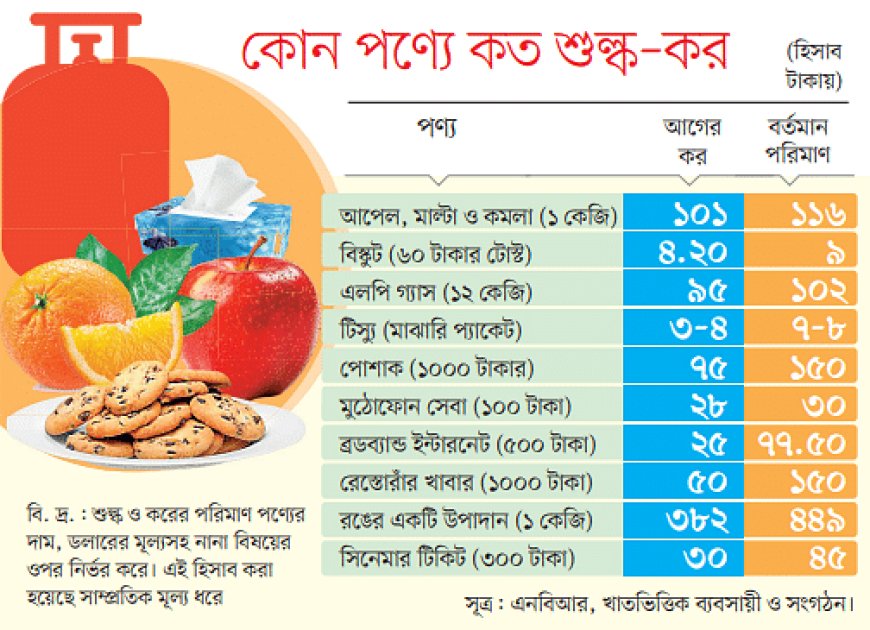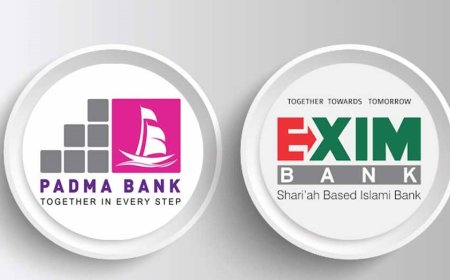An increase in customs duties and taxes will result in 12,000 crore taka remaining uncollected, effectively staying in people's pockets
An increase in customs duties and taxes will result in 12,000 crore taka remaining uncollected, effectively staying in people's pockets

Dengue outbreaks occur year-round in the country, leading to an increased demand for malt as a food for dengue and common fever patients. However, the government has raised the supplementary duty on malt imports by 10 to 30 percent, which will result in an additional cost of Tk 15 per kg for malt imports. Consequently, the total duty and tax on malt will amount to Tk 116 per kg. The price of malt in the market is already high, ranging from Tk 250 to Tk 280 per kg.
In addition to malt, the government has increased taxes on numerous goods and services, including fruits, cooking gas, mobile phone services, internet usage, restaurant meals, biscuits, tissues, corrugated iron, paints, and more. Last Thursday, a notification was issued announcing the rise in VAT and supplementary duty, and the new rates are already in effect.
Two officials from the National Board of Revenue (NBR), speaking anonymously, stated that the government could collect an additional Tk 12,000 crore annually from these increased customs duties and taxes, helping reduce the government's revenue deficit.
Economists argue that items like fruits, mobile services, internet, tissues, cooking gas, clothing, and restaurant meals are essential parts of daily life. The new tax hikes will place additional pressure on the middle and lower-middle-income populations. This means the Tk 12,000 crore will effectively be removed from the pockets of the general public. While the NBR claimed in a statement on January 5 that the increased duties and taxes do not apply to daily necessities and will not affect inflation, economists disagree, highlighting the burden on lower-income groups.
For instance, the previous government had imposed high duties on imported fruits such as apples, mangoes, and oranges in 2022, resulting in a tax burden of up to 136 percent. This has caused fruit prices to skyrocket, with apples priced at Tk 300-340 per kg, medium to large oranges at Tk 260-320, and green grapes at Tk 450-460 per kg. As a result, domestic fruit sellers are also raising their prices to match the high cost of foreign fruits.
Sirajul Islam, president of the Bangladesh Fresh Fruits Importers Association, pointed out that foreign fruits, once a healthy food option for all, have now become a luxury food for the wealthy due to the high import duties.
The increased taxes on various goods and services, including those that are now seen as essential, will lead to greater financial strain on the public. The NBR maintains that the new duties will not affect the prices of daily essentials, but it is clear that the cost of many goods will rise, as taxes on imported goods such as fruits, LPG, and biscuits have already been increased.
For example, the tax burden on a kilogram of apples, watermelons, and oranges has risen by Tk 15 to Tk 116, the tax on a 12-kg LPG cylinder has increased by Tk 7 to Tk 102, the tax on a packet of facial tissues costing Tk 65-70 has increased by Tk 4 to Tk 7-8, and the tax on clothing and restaurant meals worth Tk 1,000 has risen by Tk 75 to Tk 150.
Similarly, for mobile phone services, the government has raised taxes by 2 taka for a Tk 100 recharge, increasing the total tax burden to around Tk 30. For broadband internet, the tax on a Tk 500 bill has increased from Tk 25 to Tk 77.5.
Many businesses are already adjusting their prices due to the new tax rates. For instance, a leading biscuit manufacturer anticipates that a 250-gram pack of toast biscuits, which currently costs Tk 60, may increase to Tk 70 due to the rise in VAT. Similarly, cinema ticket prices have also been adjusted, with VAT increasing from Tk 30 to Tk 45 for a Tk 300 ticket.
In the industrial sector, VAT on liquefied petroleum gas (LPG) used in industries has increased by Tk 43, and the tax on paints and varnishes used in manufacturing has also risen. The cost of corrugated iron produced from HR coils has increased as well, with VAT rising from 5 percent to 15 percent.
In response to the new tax increases, many consumers are expressing dissatisfaction. For example, a shopper at a clothing store in Bashundhara City found that the VAT on a shirt had risen by Tk 150 due to the new 15 percent rate. Similarly, customers at restaurants are now paying higher VAT on their bills, with VAT on a Tk 1,000 meal increasing from Tk 50 to Tk 150.
The increased tax burden on various sectors, including retail, industrial production, and services, is already causing significant strain on businesses and consumers alike.
What's Your Reaction?





















































































